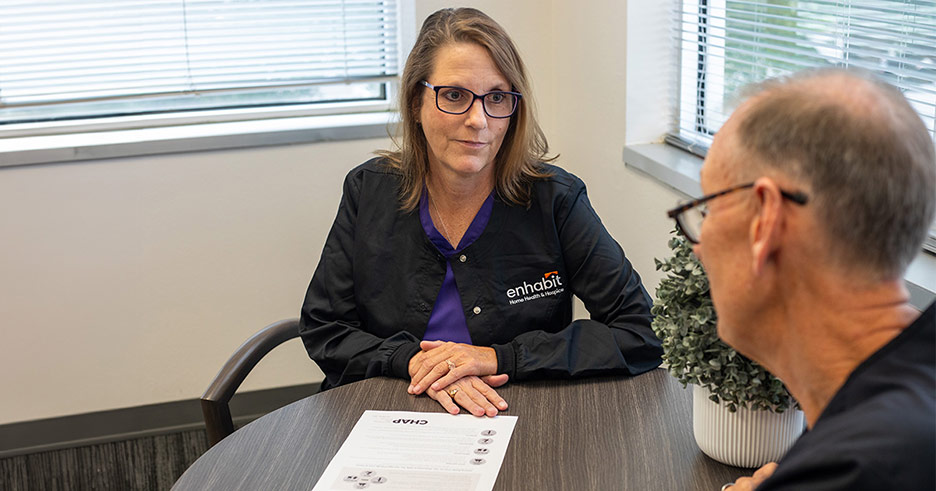Having a leader you can count on is critical to employee satisfaction, engagement and even mental health. A recent study from the Workforce Institute at UKG found that managers impact an employee’s mental health at a higher rate than physicians and the same rate as a partner or spouse.
It is clear that managers make a big impact on employee’s health and wellbeing. That’s why at Enhabit Home Health & Hospice, leaders focus on supporting their team’s mental health.
In an industry that deals with sickness and the end of life, Enhabit leaders pride themselves in guiding their teams with compassion, empathy and attention to their emotional status. Although each person has their own leadership style, here are top tips from branch directors across the country that help them support their team’s mental health.
Enhabit leaders start with themselves
Branch Director Caycee started her career as a nurse in the hospital. By the time she came to Enhabit, she knew that nursing was a tough job and that she would have to support her team emotionally. But she understood that she wouldn’t be able to support her team without supporting herself.
“I really do think it’s important that you start with taking care of yourself via self-care or finding time to unwind,” she said. “That filters out to your team and their patients. If you feel good, your teams will feel good mentally and then they’ll be able to provide the best care.”
Be authentic in your leadership style
Leadership and communication styles are changing as generations age in and out of the workplace. While baby boomers might have preferred results-driven management, millennials and Generation Z want empathetic and authentic connection from their leaders.
“I think historically there has been an importance on having really firm boundaries and separation between your employees and yourself,” Carin said. “But I think that once you create vulnerability in your leadership, it helps you both. It helps your team be able to relate to you and it helps to process some of the things you’re dealing with as well.”

Teach your team about mental health support and benefits
A lot of employers offer employee assistance programs or access to mental health services via insurance. Leaders like Carin dedicate time to learning about mental health and the services available to their teams.
“My team knows that at Enhabit, mental health is health,” she said. “We’ve had entire case conferences dedicated to mental health where I’ve printed out therapeutic coloring sheets, business cards with the 988 mental health hotline number on it and the Enhabit employee assistance program information. I also really encourage people to take their paid time off because burnout has always been rampant in health care. We have tough jobs and so I really try to encourage taking care of yourself wherever possible.”
Although an employer may have programs like the ones mentioned above, it’s commonplace for employees to not know they have resources like that as part of their benefits package. If Caycee ever notices an employee is struggling, she makes sure that they know about the assistance Enhabit offers.
“I’m very glad I am able to help my team get assistance because sometimes they don’t even know it’s available to them through Enhabit,” she said. “I’ve struggled before too. And that’s why I think it’s really important to have a leader that knows that there are resources out there that are helpful.”
Check in with each person individually
During the hustle and the bustle of the work day, it can be hard to find time to connect and learn more about your team’s preferences and ways they like to receive support.
Branch Director Brandy says the most important thing she does as a leader is have intentional one-on-one meetings, or “All About You” time, where she sits with each member of her team and learns what’s most important to them personally and at work.
“During these meetings, we may talk about work or we may talk about what’s going on in their lives,” she said. “Whatever is important to them during that hour is important to me. That is where I find I connect the most to each staff member. And then when I know what’s important to them, I can know what’s important to our team as a whole.”

Use positivity whenever you can
In a field that deals with sick patients each day, Brandy says it’s easy to get caught in a slump, especially when grieving a patient.
To help her team keep their spirits up, she continuously looks for reasons to brag on her staff via positive emails or printing out patient satisfaction surveys. And she’s always looking for a reason to get everyone together and bring spirits up.
“Culture is my favorite thing,” Brandy said. “We look for reasons to party. You can get so caught up in the day to day of our industry. With my team, we are intentional about getting together and figuring out what we can do to get you out of a slump emotionally or mentally. I think it’s so important to build that relationship so everyone knows they aren’t alone and can rely on their coworkers.”

Have empathy toward each person’s home life
While employees spend a large chunk of their day at work, they do return home to different environments, relationships and struggles. Caycee thinks one of the most important things a leader can do is remember that everyone has a separate home life that they need to take care of.
“My team knows that I am a mom myself and so I get the home life part,” she said. “I’ve got an open-door policy. They can always come to me about anything going on and share as much as they want. I am always going to be really receptive and supportive of their family or mental health needs.”
Along with empathy, flexibility is an important leadership trait to Carin. Because of her flexible leadership style, she sees that her team steps up for someone else when they need support because they trust they will do the same for them in the future.
“Sometimes, you have to break some of those stereotypes we all grew up with like having to give so much notice or not being able to take time off to take care of your family last minute,” she said. “But being flexible ultimately benefits the branch and our bottom line. There is a lot to be said for leading with flexibility and kindness.”
Breaking the mental health stigma through leadership at Enhabit
According to a study from the American Psychiatric Association, only 1 in 5 employees are completely comfortable discussing their mental health with their colleagues or supervisors.
To leaders like Caycee, it’s important to talk about mental health with their team and put yourself in each person’s shoes. Then, you can offer appropriate support while helping to break the stigma surrounding mental health.
“Leaders need to dig deep down to see if they were employees struggling with their mental health, how would they want to be approached to get help?” she said. “A lot of people don’t want to talk about mental health so it may be even as simple as checking in with your team and making them feel valued. Then, they know they have that support and can feel more comfortable opening up. But you have to not be afraid to talk about it to help break the stigma and spread the word about what resources are available.”
To learn more about career opportunities at Enhabit, search our open career opportunities near you or sign up for job alerts by texting “CARE” to 98199.
Social Share
At Enhabit our patients are our number one priority. From providing the latest medical practices to building deep personal connections, we’re focused on upholding every patient’s dignity, humanity and sense of control on their health care journey.
Home health
Our home health services give patients access to the care they deserve in the comfort of their own homes. From disease and injury management to recovery from surgery, our clinicians help patients confidently achieve their healthcare goals.
Hospice care
Our hospice care services place importance on the comfort of every patient living with a terminal illness. Our caring professionals are dedicated to providing not just physical care, but spiritual and emotional support to every patient and their loved ones.






